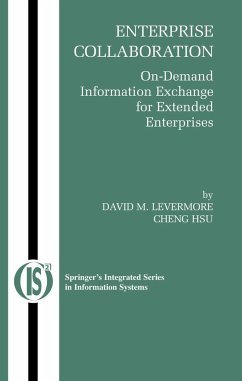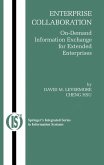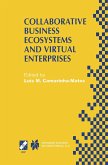There are some complex organizational and technical forces behind the emerging momentum of Enterprise Collaboration, and these factors will lead to the emergence of a model of collaboration to achieve the goals of integration for enterprises and extended enterprises.
Enterprise Collaboration: On-Demand Information Exchange for Extended Enterprises will go beyond the discussion of global databases and present a general Enterprise Resources Market model to facilitate the management and integration of enterprise information resources in a cooperating mode. The bulk of the book will discuss this particular concept in depth and implement a general model to focus on a new publish-and-subscribe model for information resource owners to cooperate at a scale much larger than the traditional global query.
Global supply chain is a fact of life in today's world. From the perspective of the First World, this practice reigns in outsourcing of jobs that, in the view of many, threatens a way of life. This argument actually implies that outsourcing represents a fair chance for the Third World to catch up and reverse-leverage through market economy. However, many in the Third World are also opposed to the global market economy from an opposite argument. The fact that matters is, of course, that globalization continues to progress relentlessly in its own momentum, and that the national playing grounds continue to level globally for both Worlds. Would globalization results in the rich nations getting richer and the poor poorer; or would it help the world united in the same economical reason? The questions that we the researchers could try to answer are a different kind, the kind that leads to the understanding of the elements of "the fittest" in the global competition. For instance, what defines an enterprise's staying power on the top of the food chain, or an economy's ability to design and control the global supply chains, in the long term? Evidently, to understand this ability the field needs to study the engineering prowess required, as much as the finance and management if the history of industrial revolution is any guide. Yet, the study on the engineering of global supply chains has been largely lacking.
Enterprise Collaboration: On-Demand Information Exchange for Extended Enterprises will go beyond the discussion of global databases and present a general Enterprise Resources Market model to facilitate the management and integration of enterprise information resources in a cooperating mode. The bulk of the book will discuss this particular concept in depth and implement a general model to focus on a new publish-and-subscribe model for information resource owners to cooperate at a scale much larger than the traditional global query.
Global supply chain is a fact of life in today's world. From the perspective of the First World, this practice reigns in outsourcing of jobs that, in the view of many, threatens a way of life. This argument actually implies that outsourcing represents a fair chance for the Third World to catch up and reverse-leverage through market economy. However, many in the Third World are also opposed to the global market economy from an opposite argument. The fact that matters is, of course, that globalization continues to progress relentlessly in its own momentum, and that the national playing grounds continue to level globally for both Worlds. Would globalization results in the rich nations getting richer and the poor poorer; or would it help the world united in the same economical reason? The questions that we the researchers could try to answer are a different kind, the kind that leads to the understanding of the elements of "the fittest" in the global competition. For instance, what defines an enterprise's staying power on the top of the food chain, or an economy's ability to design and control the global supply chains, in the long term? Evidently, to understand this ability the field needs to study the engineering prowess required, as much as the finance and management if the history of industrial revolution is any guide. Yet, the study on the engineering of global supply chains has been largely lacking.








